Best Crypto Exchanges in Pakistan
.webp)
Summary: Pakistan is rapidly developing its cryptocurrency sector, with new regulations introduced under the 2025 Virtual Assets Ordinance and oversight by the Pakistan Virtual Assets Regulatory Authority (PVARA). The State Bank is also piloting a central bank digital currency.
Here are the leading crypto exchanges supporting deposits in Pakistani Rupees (PKR):
Bybit is the top choice for crypto investors in Pakistan, offering an impressive selection of digital assets for trading and staking, and supporting various PKR deposit options.
Available Markets
2,100+ Cryptocurrencies
Trading Fees
0.1% Spot Trading Fees
PKR Deposit Methods
Bank Transfer, Easypaisa, Credit Card, Debit Card
Top Crypto Trading Platforms in Pakistan
Pakistan’s crypto market is moving toward clearer regulation under the Pakistan Virtual Assets Regulatory Authority (PVARA), with growing adoption among retail and institutional investors. Traders can access both international and local exchanges, with support for PKR deposits. The table below highlights the leading platforms, comparing fees, features, and digital asset availability.
1. Bybit
Bybit is the best crypto exchange in Pakistan, offering a powerful mix of spot trading, perpetual futures, and structured products. Launched in 2018, the exchange now serves 75 million users in over 180 countries and reports daily volumes above $50 billion, putting it among the largest players globally.
The platform supports over 2,100 cryptocurrencies, alongside leveraged futures (up to 200×), and other features like Copy Trading and Trading Bots (Grid, DCA, Futures Combo). There is also Bybit Earn, which offers flexible savings, fixed-income products, and dual-asset strategies.
Additionally, Bybit is expanding into Web3 through its non-custodial wallet, NFT marketplace, and DeFi hub, giving Pakistanis access to on-chain applications. The exchange also offers a strong Islamic Account option, catering to Sharia-compliant trading preferences in Pakistan.
Platform Highlights:
- Fees: 0.1% for spot trading.
- Supported Assets: 2,100+ cryptocurrencies.
- Regulation & Licensing: Licensed in Dubai and accessible from Pakistan; complies with global AML and KYC standards.
- PKR Deposit Methods: Credit card, debit card, bank transfer (via P2P), UPaisa (via P2P), Easypaisa (via P2P), JazzCash (via P2P), SadaPay (via P2P), NayaPay (via P2P).
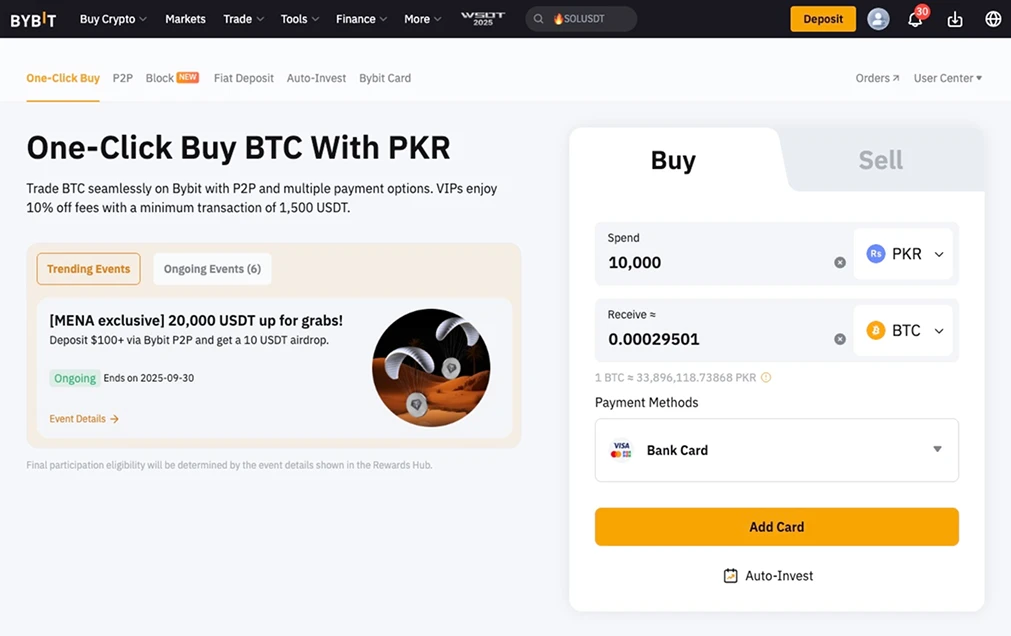
2. Binance
Binance is built for scale, which is why larger Pakistani trading desks and funds use it for execution and custody. The exchange serves 280 million users globally and runs one of the deepest order books in crypto, with spot, margin, futures, and options all under one roof.
VIP & Institutional clients get a dedicated account manager, lower fees through tiered pricing, and 24/7 priority support. For professional stacks, Binance offers OTC block trading, Portfolio Margin (unified collateral across accounts), fund accounts for managers pooling client assets, and API connectivity.
The platform regularly publishes its Proof of Reserves and maintains a SAFU insurance fund. Retail investors can use Earn, Auto-Invest, Launchpool/Megadrop, and the Academy to support research and yield strategies, while larger desks lean on OTC RFQs and structured products.
Platform Highlights:
- Fees: Spot from 0.1% with VIP discounts for BNB holders.
- Supported Assets: 350+ cryptocurrencies and 1,900+ trading pairs (spot, margin, futures, options).
- Regulation & Licensing: 20+ registrations worldwide and available in Pakistan.
- PKR Deposit Methods: P2P marketplace only - Easypaisa, bank transfer and United Bank Limited.

3. OKX
OKX blends a full-stack trading suite with friendly on-ramps for Pakistani users with PKR deposits. On the CEX side you get spot, margin, perpetual and dated futures, plus options, with quick convert offering zero-fee conversions and no slippage for fast switches between majors and stablecoins.
The headline feature for power users is OKX Wallet, a self-custody, multi-chain wallet spanning 130+ native networks. It’s a gateway to Web3 with DEX routing for best-price swaps, NFT marketplace access, on-chain Earn/staking, and a rich discovery layer for DeFi protocols and new tokens.
Automation is another draw. OKX Trading Bots cover spot grid, futures grid, DCA, smart arbitrage, signal bots, and more. For desks and funds, OKX runs an OTC liquidity network, portfolio margin, deep futures spreads liquidity, and consolidated reporting, so teams can manage risk.
Platform Highlights:
- Fees: Spot from 0.08% maker and 0.1% taker.
- Supported Assets: 400+ cryptocurrencies.
- Regulation & Licensing: Operates through regional entities and prepared to align with PVARA requirements.
- PKR Deposit Methods: Credit card, debit card, bank transfers (via P2P), Easypaisa (via P2P), JazzCash (via P2P).
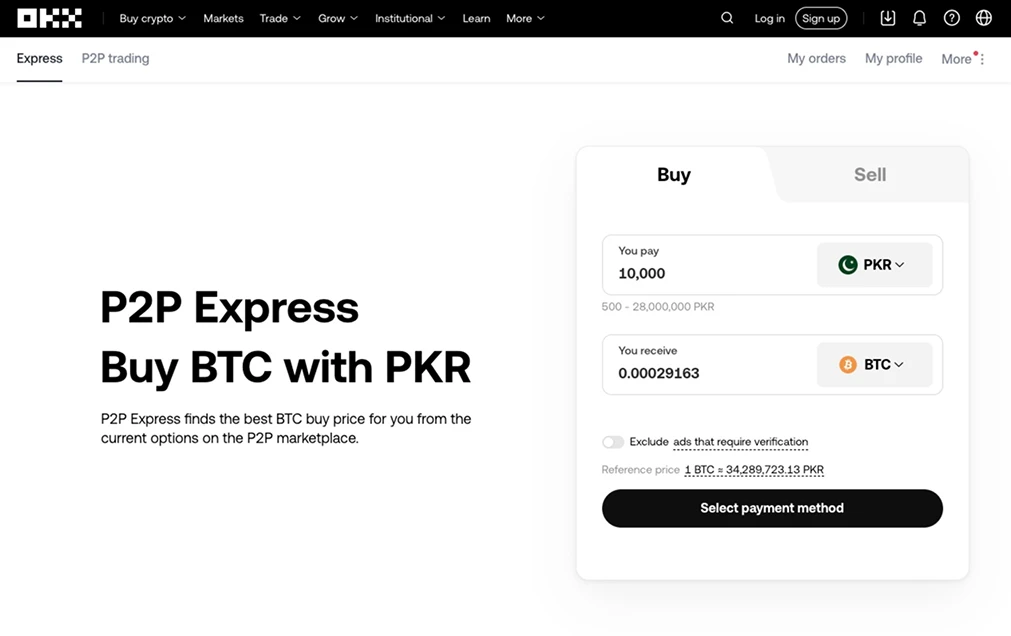
4. Gate
Gate suits Pakistani investors who want early access to tokens. The exchange reports $34.6B 24h volume and a catalogue of 3,500+ cryptocurrencies, ideal for hunting small-cap listings. Core trading covers spot, margin, and futures, while Quick Buy makes first purchases simple.
In addition to trading pairs, Gate layers on utility. Simple Earn advertises target yields (e.g., 10.50% APR), while Gate Startup gives access to new token sales before they hit bigger venues. There’s an NFT marketplace, Gate Pay for merchant payments, and an OTC desk for larger trades.
For Pakistan, the practical draw is liquidity plus choice. You can rotate across sectors, L1s, memecoins, AI, RWA, without hopping platforms. Copy trading and strategy tools shorten the learning curve, while proof-of-reserves and a published reserve ratio (~124%) speak to transparency.
Platform Highlights:
- Fees: Spot trading starts from 0.2% (standard tier); VIP discounts apply.
- Supported Assets: 3,600+ cryptocurrencies.
- Regulation & Licensing: Regulated globally and accessible from Pakistan.
- PKR Deposit Methods: P2P marketplace only.
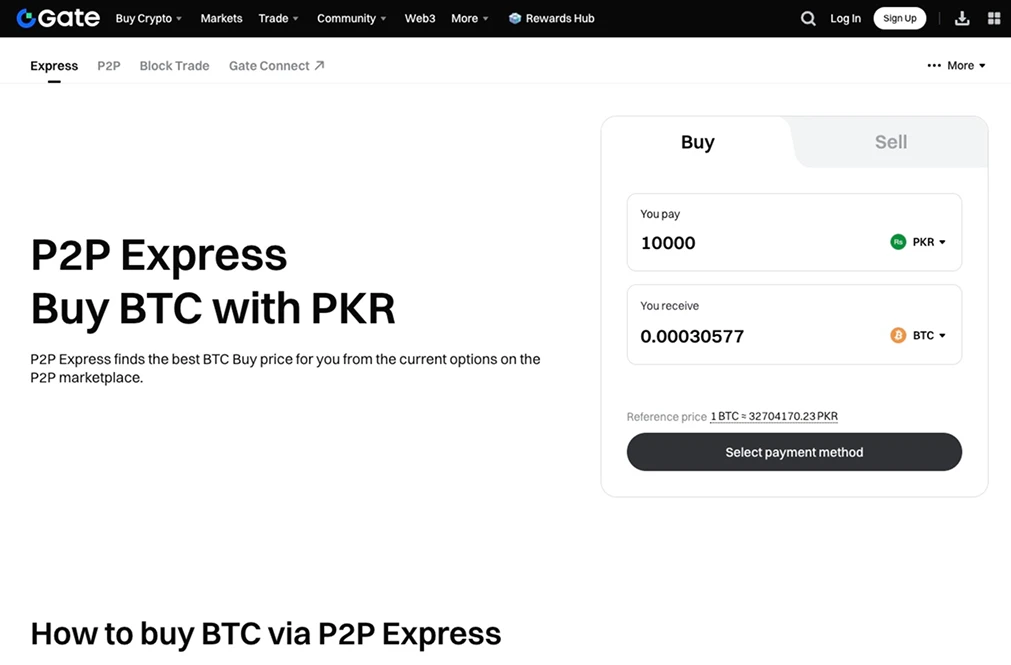
5. KuCoin
KuCoin brands itself as the “People’s Exchange” and has built serious traction globally, now serving 40 million+ investors. Pakistani traders are drawn to its reputation for altcoin diversity, the exchange lists 900+ cryptocurrencies, many of which appear here before hitting larger competitors.
The Earn program is central for yield hunters. It bundles Simple Earn (flexible savings), fixed staking, structured products, and crypto lending. Yields vary widely, from conservative 2-4% on stablecoins to double-digit APY on tokens, with some promotional pools offering over 350% APR.
The Trading Bot suite (spot grid, DCA, futures bots) lets investors run strategies without constant monitoring, while GemSPACE provide early access to emerging tokens. Security is bolstered by Proof of Reserves (PoR), a published 1:1 asset backing, and a Safeguard Program for emergencies.
Platform Highlights:
- Fees: 0.1% spot trading, lower with KCS token discounts; futures/margin fees competitive with tiered rebates.
- Supported Assets: 900+ cryptocurrencies.
- Regulation & Licensing: Licensed in several jurisdictions and available to Pakistani investors.
- PKR Deposit Methods: Credit card, debit card, Google Pay.
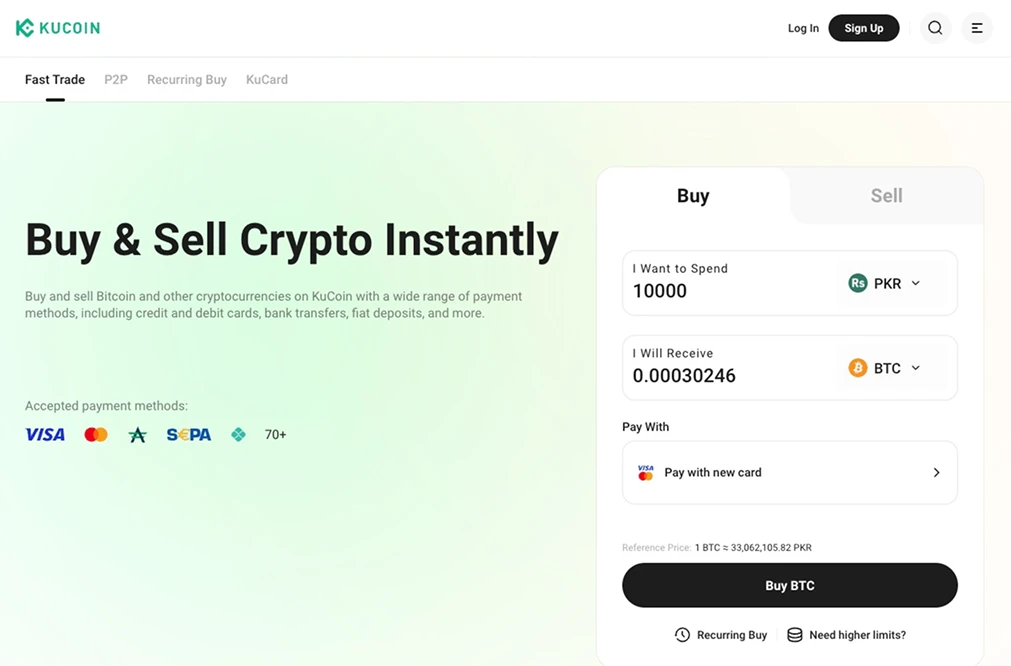
6. Bitget
Bitget has carved out a strong following in Pakistan, particularly among newer traders who want to learn by following others. The platform lists over 800 assets across spot, futures, and margin markets, while also offering access to its native token BGB, which powers loyalty benefits and fee discounts.
Where Bitget stands apart is its copy trading ecosystem. Traders can choose from spot, futures, and bot copy trading, connecting directly with verified professionals. The leaderboard displays ROI, drawdown, and AUM, letting users filter and follow strategies that suit their risk appetite.
Aside from copy trading, Bitget provides Earn products for passive income, a Web3 wallet for on-chain activity, and fiat support for PKR through its OTC and card rails. The exchange also highlights transparency, publishing Proof of Reserves and running a Protection Fund as a safety net.
Platform Highlights:
- Fees: Spot trading at 0.1%.
- Supported Assets: 800+ cryptocurrencies.
- Regulation & Licensing: Operates internationally under AML/CFT standards; not yet licensed in Pakistan under PVARA.
- PKR Deposit Methods: P2P marketplace only - SadaPay, Easypaisa, ABA, UBL Omni, Upaisa.
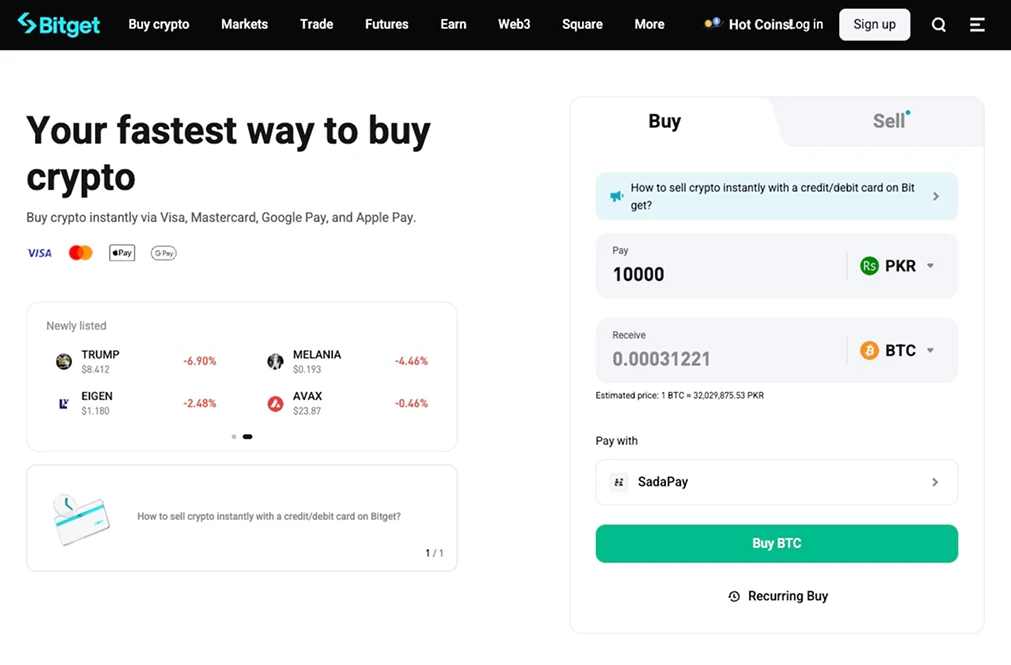
Is Crypto Regulated in Pakistan?
In 2025, Pakistan charted a remarkable shift from caution to clarity in its cryptocurrency stance, introducing a structured framework to govern digital assets. The year began with the launch of the Pakistan Crypto Council (PCC) in March, led by Finance Minister Muhammad Aurangzeb and CEO Bilal Bin Saqib, with strategic guidance from Changpeng Zhao.
Its mission is to unify stakeholders, design regulatory sandboxes, and set a forward-looking vision for crypto adoption. In July, the government enacted the Virtual Assets Ordinance, 2025, birthing the independent Pakistan Virtual Assets Regulatory Authority (PVARA) to license and supervise virtual asset service providers and enforce anti-money laundering standards.
Parallel to these reforms, the State Bank of Pakistan is launching a central bank digital currency (CBDC) pilot and preparing a legal basis for virtual asset oversight. Pakistan is also aligning its strategy with global trends by allocating surplus energy to bitcoin mining and AI data centers and establishing a national bitcoin reserve
How is Crypto Taxed in Pakistan?
In Pakistan, cryptocurrency tax treatment remains unsettled, but current guidance suggests applying existing tax laws under the purview of the Federal Board of Revenue (FBR). Traders and investors should consider the following possible tax categories:
- Capital Gains Tax (CGT) – Profits from selling cryptocurrencies held as investments may be taxed under CGT rules, potentially using standard income tax slabs (ranging roughly from 0% to 35%) in the absence of dedicated crypto provisions.
- Business Income – Regular trading, mining, or staking could be classified as business activity, with income taxed according to individual or corporate rates, potentially up to 35%.
Regulatory pressure from entities like the IMF has intensified, with recommendations including the classification of crypto assets as securities and subjecting them to CGT at around 15%. Overall, the crypto tax environment in Pakistan is fragmented and evolving, with few concrete rules yet in place and a strong need for clarity.
Cryptocurrency Adoption in Pakistan
Pakistan’s cryptocurrency market is entering a strong expansion phase, supported by growing investor interest and early steps toward regulatory clarity.
According to Statista Market Insights, user adoption is accelerating, with the number of crypto users projected to reach 28.9 million by 2026. This translates to a 10.99% of the population in 2025, inching upward to 11.15% in 2026.
A unique driver of this momentum is the government’s initiative to channel surplus electricity into bitcoin mining and AI data centers, creating infrastructure that supports both blockchain innovation and energy utilization.
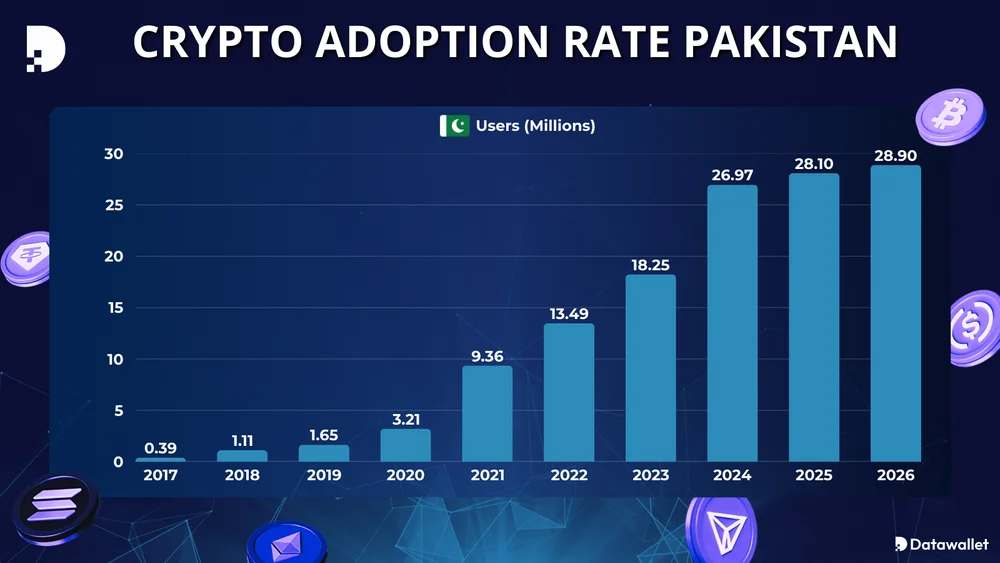
How to Buy Bitcoin in Pakistan
Pakistani residents looking to buy Bitcoin now have clearer pathways thanks to the growing number of exchanges supporting PKR deposits. Here’s a straightforward guide to getting started with BTC in Pakistan:
- Select a Crypto Exchange: Choose a reliable exchange that accepts Pakistani users and supports local payment options. Leading global platforms alongside regional providers are increasingly offering PKR deposit methods in line with compliance requirements.
- Create Your Account: Register on the exchange and complete Know Your Customer (KYC) verification. This usually involves submitting a valid CNIC or passport, along with proof of residence such as a utility bill or bank statement.
- Deposit Funds: Add funds to your account through supported methods. In Pakistan, options often include bank transfers in PKR, mobile wallets, and international debit or credit cards.
- Purchase Bitcoin (BTC): Once your account is funded, head to the Bitcoin section of the platform. Enter the amount you wish to buy, carefully review the order details, and confirm the purchase.
By following these steps, investors in Pakistan can safely purchase Bitcoin through regulated exchanges that emphasize security, transparency, and compliance.
Final Thoughts
Pakistan’s crypto sector is at a turning point as regulation is taking shape, exchanges are competing to capture local demand, and investors have more secure ways to enter the market than ever before.
For traders, the key is to match goals with the right platform, whether that means Bybit’s product depth, Binance’s institutional scale, OKX’s DeFi gateway, Gate’s token diversity, KuCoin’s yield options, or Bitget’s copy trading network.
Frequently asked questions
Can I use mobile wallets like Easypaisa or JazzCash to buy crypto in Pakistan?
Yes, most leading exchanges that serve Pakistan, including Bybit, Binance, and KuCoin, support P2P transfers via Easypaisa, JazzCash, and local bank accounts, making it easy to fund accounts in PKR.
Are Islamic-compliant crypto accounts available in Pakistan?
Some platforms such as Bybit now offer Islamic account options that align with Sharia-compliant principles, giving Pakistani investors access to crypto trading without interest-based products.
What is the safest way to store cryptocurrency after buying in Pakistan?
While exchanges provide custodial wallets, many investors prefer self-custody wallets like OKX Wallet or hardware wallets to reduce counterparty risk and keep their assets under personal control.
How does Pakistan’s central bank digital currency (CBDC) impact crypto traders?
The State Bank’s CBDC pilot is separate from private cryptocurrencies, but its rollout may increase regulatory clarity and encourage stronger infrastructure for crypto transactions across the country.
%2520(1).webp)
Written by
Antony Bianco
Head of Research
Antony Bianco, co-founder of Datawallet, is a DeFi expert and active member of the Ethereum community who assist in zero-knowledge proof research for layer 2's. With a Master’s in Computer Science, he has made significant contributions to the crypto ecosystem, working with various DAOs on-chain.

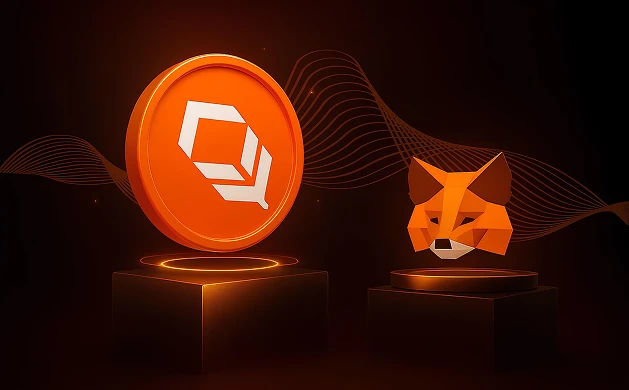
%25201%2520(1).webp)

.webp)




